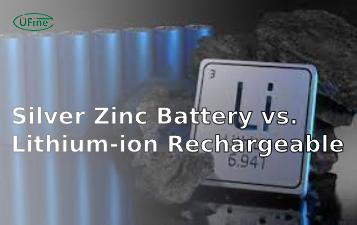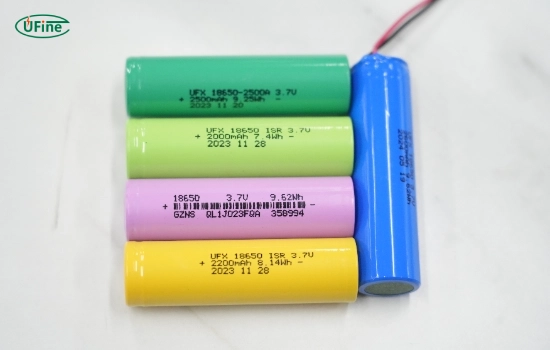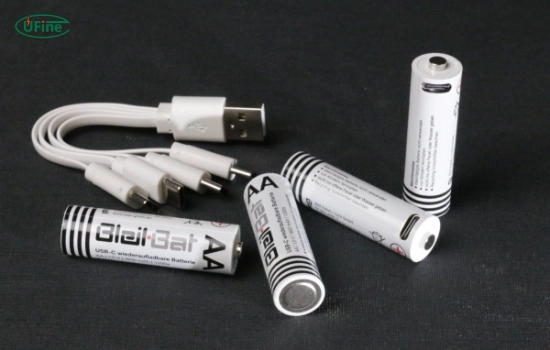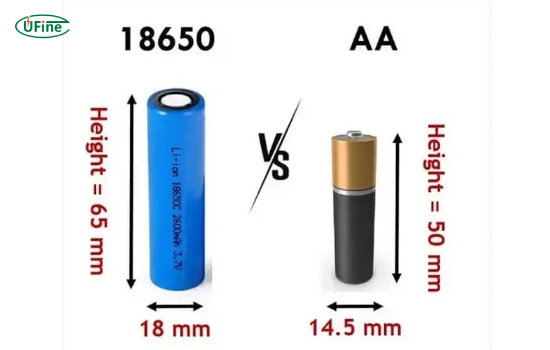
18650 and AA batteries are indispensable power sources in our daily lives, powering many devices. In this comparison, we’ll delve into the differences between two commonly used battery types: the 18650 and AA batteries. Both play significant roles in various industries and everyday applications.
Part 1. What is an 18650 battery?
An 18650 battery is a lithium-ion rechargeable cell with a cylindrical shape of 18mm by 65mm. It is renowned for its high energy density and rechargeability, commonly employed in various electronic devices due to its ability to provide sustained power. This battery type has gained popularity for its reliability and efficiency in delivering consistent performance across multiple applications.
18650 Battery Advantages
- High Energy Density: 18650 batteries are known for their exceptional energy density, providing extended usage periods without requiring frequent recharges.
- Rechargeable Nature: These rechargeable batteries offer cost-effectiveness and less environmental impact than single-use alternatives.
- Versatility: They excel in powering high-drain devices like laptops, flashlights, and electric vehicles because they can handle substantial power demands.
- Longevity: With proper care, 18650 batteries have a longer lifespan than many other battery types, contributing to their reliability in various applications.
18650 Battery Shortages
- Market Demand: The 18650 battery market occasionally faces shortages due to surges in demand across diverse industries, including electronics, energy storage, and vaping.
- Production Challenges: Manufacturers need help to meet the increasing demand, leading to intermittent supply shortages and impacting availability and pricing in the market.
- Global Trends: Fluctuations in the availability of raw materials and manufacturing capacity also contribute to periodic shortages in the 18650 battery market.
18650 Battery Shortages and Market Trends
- Supply Chain Challenges: The demand for 18650 batteries has surged, driven by industries like electric vehicles and renewable energy storage. As a result, the 18650 market faces occasional supply shortages, impacting pricing and availability.
- Future Trends: Looking ahead, as electric vehicle production scales up, the demand for 18650 batteries will likely continue to increase. Additionally, advancements in energy storage technologies will drive further demand for these high-performance lithium-ion batteries.
18650 Battery Uses: Applications in High-Performance Devices
18650 batteries are ideal for high-drain devices such as power tools, laptops, and electric vehicles. Due to their superior energy density, 18650 batteries provide long-lasting power for devices that require continuous high output, making them the best batteries for high-drain devices.
- Electronics: Ideal for laptops, power tools, and portable chargers due to their high energy density and long-lasting power.
- Electric Vehicles: 18650 batteries are extensively used in electric vehicles, providing the necessary energy to drive the vehicle efficiently.
- Outdoor Activities: When choosing batteries for outdoor activities, 18650 batteries are the best option for high-performance flashlights and camping equipment, thanks to their robust energy output.
Part 2. What is an AA battery?
An AA battery is a small, round battery used in many devices like toys and remote controls. It’s about 1.5 cm wide and 5 cm tall. You can get them as throwaway or reusable. They’re handy for lots of things because they’re typical, fit in many gadgets, and are not expensive.
AA Battery Advantages: AA Battery Energy Density
AA batteries, while not as energy-dense as 18650 batteries, still provide adequate power for many low-drain devices. Their energy density makes them a cost-effective solution for powering everyday household electronics like remote controls and toys.
- Versatility: AA batteries are compatible with many devices, from everyday household items like remote controls and clocks to small electronic gadgets and toys.
- Widespread Availability: They are widely accessible in most stores, making them easily replaceable whenever needed, ensuring continuous power for devices.
- Affordability: AA batteries are relatively inexpensive compared to larger rechargeable batteries, offering cost-effective power solutions for everyday gadgets.
- Convenience: Their compact size and standardized shape allow for easy interchangeability among various devices, providing convenient power solutions for many purposes.
AA Battery Shortages
- Limited Capacity: AA batteries generally have lower energy density than larger rechargeable batteries, resulting in shorter usage durations, especially in high-drain devices.
- Disposable Nature: Most AA batteries are disposable, contributing to environmental concerns due to the accumulation of used batteries and the need for proper disposal or recycling.
- Rechargeable Versions: While rechargeable AA batteries exist, they often have lower capacity and may require frequent recharging compared to other rechargeable cell sizes, impacting their long-term cost-effectiveness.
- Performance in High-Drain Devices: In devices with high power demands, AA batteries might not deliver sustained performance, leading to quicker depletion and the need for frequent replacements.
AA Battery Shortages and Future Trends
- Environmental Concerns: The disposable nature of AA batteries contributes to environmental challenges, prompting a shift towards more sustainable battery technologies and increased use of rechargeable AA batteries.
- Market Demand: The demand for AA batteries is steady, but as portable electronics and smart devices proliferate, there may be growing demand for more efficient, rechargeable AA batteries.
AA Battery Uses: Everyday Applications
- Household Electronics: AA batteries are commonly used in remote controls, clocks, wireless keyboards, and computer mice, providing an affordable and readily available power source.
- Toys and Gadgets: They are frequently found in handheld gaming devices, toys, and other small electronic gadgets due to their compact size.
- Health Devices: AA batteries power many health-related devices, such as blood pressure monitors and thermometers, providing reliable energy for everyday needs.
Part 3. What is the difference between 18650 and AA batteries? (18650 vs AA battery comparison)
In this section, we will explore a detailed 18650 vs AA battery comparison, focusing on the size, energy density, performance, and specific use cases for both batteries. This comparison will help you understand which battery type is the best fit for your needs.
Size- 18650 Batteries: These batteries are notably more prominent, with dimensions around 18mm in diameter and 65mm in length, offering a more extensive physical footprint than AA batteries.
- AA Batteries: In contrast, AA batteries are smaller, typically with a diameter ranging from 14.5mm to 14.9mm and a height between 50.5mm and 50.7mm, making them more compact and portable.
Capacity and Energy Density
- 18650 Batteries: Renowned for their high energy density, 18650 batteries possess larger capacities, allowing for sustained usage in high-drain devices like laptops and electric vehicles.
- AA Batteries: While versatile, AA batteries generally have lower energy densities and capacities than the 18650s, making them more suitable for smaller, low-power devices.
Voltage and Performance
- 18650 Batteries: These batteries often provide higher voltages, typically around 3.7V, making them suitable for applications requiring more substantial power outputs.
- AA Batteries: AA batteries usually deliver lower voltages, typically around 1.5V, making them more suitable for devices with lower power requirements.
Applications and Usage
- 18650 Batteries: Primarily found in devices that demand higher power, such as laptops, power tools, flashlights, and electric vehicles, due to their capacity to handle substantial power draws.
- AA Batteries: Widely used in everyday household items like remote controls, toys, clocks, and smaller electronic gadgets due to their smaller size and compatibility with low-power devices.
Rechargeability
- 18650 Batteries: Typically designed as rechargeable cells, 18650 batteries offer a more sustainable and cost-effective option than single-use batteries.
- AA Batteries: Available in both disposable and rechargeable forms, offering flexibility in usage, but rechargeable versions might have lower capacity than specialized rechargeable cells like 18650s.
Rechargeability: Rechargeable AA vs 18650
While both AA and 18650 batteries offer rechargeable versions, the 18650 generally provides a higher capacity and longer lifespan compared to rechargeable AA batteries. This makes the 18650 a more reliable option for high-drain devices that require frequent recharging.
Size, Capacity, and Voltage: Choosing the Right Battery for Your Device
When deciding between 18650 and AA batteries, size, capacity, and voltage are crucial factors that determine the suitability for different devices. Here’s a breakdown:
- 18650 Batteries: With a diameter of 18mm and length of 65mm, 18650 batteries offer superior capacity (up to 3500mAh) and higher voltage (3.7V), making them ideal for high-drain devices such as power tools, laptops, and electric vehicles.
- AA Batteries: AA batteries are smaller (14.5mm in diameter, 50.5mm in height), typically offering a lower capacity (around 2500mAh) and voltage (1.5V), making them better suited for lower-power devices like remote controls, toys, and small household gadgets.
For devices with higher power demands, such as gaming laptops or power tools, 18650 batteries provide a more reliable power source. On the other hand, AA batteries are perfect for everyday gadgets that don’t require substantial energy output.
Part 4. FAQs
-
Can you use AA batteries instead of 18650?
Generally, AA batteries are not direct substitutes for 18650 batteries due to size, voltage, and capacity differences. Adapting or modifying a device to use AAs instead of 18650s may not be feasible or recommended. -
What is an 18650 battery equivalent to?
An 18650 battery is equivalent to multiple AA or AAA batteries in terms of voltage but provides higher capacity and energy density. However, they are not directly interchangeable due to size and voltage differences. -
What is so special about 18650 batteries?
18650 batteries are known for their high energy density, rechargeability, and ability to deliver sustained power. Due to their performance and reliability, they’re commonly used in various applications like laptops, flashlights, power tools, and electric vehicles. -
What can you power with 18650 batteries?
18650 batteries can power many devices such as flashlights, vaping devices, cordless power tools, portable electronics like laptops and cameras, and even electric vehicles when used in battery packs. -
Is an 18650 battery the same as 3 AAA?
No, an 18650 battery is not the same as 3 AAA batteries. An 18650 battery is a single-cell lithium-ion rechargeable battery with higher voltage and capacity than three AAA alkaline batteries connected in series.
Related Tags:
More Articles

What is the Difference Between Silver Zinc Battery vs. Lithium-ion Rechargeable?
Compare silver zinc and lithium-ion rechargeable batteries: energy density, cycle life, safety, cost, and uses in drones, medical devices, EVs, and electronics.
What are Watts and Watt Hours in Battery?
Understand watt vs watt-hour in batteries: key differences, how to calculate capacity, and why they matter. Includes free comparison table.
Best 10 Blood Pressure Monitor Battery Review: Finding the Most Reliable
Are you looking for a reliable Blood Pressure Monitor battery? Here is a complete guide with the top 10 best blood pressure monitor batteries.
Bluetooth Headphone Battery Guide: All You Need to Know
Maximize headphone battery life with expert tips! Learn how to charge, check, troubleshoot, and choose the best bluetooth headphone battery in 2025.
LiFePO4 Battery VS. Lithium-ion Polymer Battery: Which One Is Best?
Comprehensive comparison of LiFePO4 vs Lithium Ion Polymer batteries: energy density, safety, lifespan, cost. Find out which battery suits your needs in 2025.





